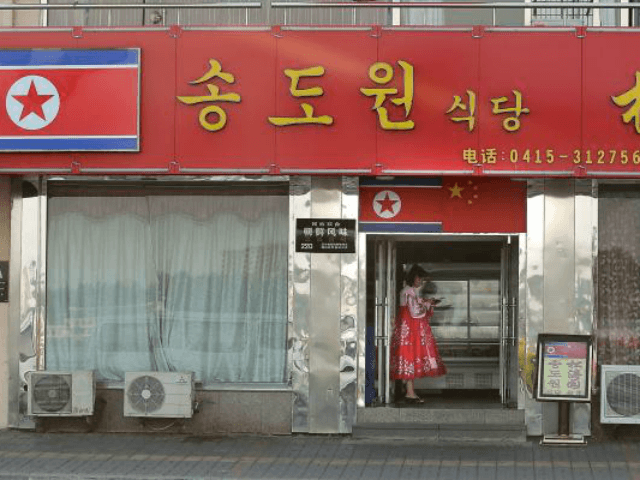The South Korean outlet Yonhap reported on Monday that closed North Korean restaurants near the border in China have begun renovations, a sign that they are preparing for sanctions to lift on the country as part of an ongoing dialogue with the United States.
North Korea has established a global network of restaurants specializing in North Korean food and entertainment, catering largely to Chinese tourists. China shut down all North Korean businesses in September as part of United Nations sanctions on the country, implemented in response to the nation’s sixth illegal nuclear test.
The reports of renovations beginning inside the closed restaurants follow nearly two weeks of rumors that China has begun laying the groundwork for dominating the economy of North Korea once sanctions lift, and reports that Beijing officials have already started enforcing sanctions on North Korean businesses less frequently on the border, fining individuals for smuggling but not confiscating their cargoes.
China is North Korea’s largest trade partner and dominant ally.
The restaurants Yonhap identified as getting remodeled are located in Liaoning, Jilin, and Heilongjiang, three of the nation’s border provinces along the Yalu River, which divides North Korea from China. Yonhap cites unnamed sources as seeing construction around the locales.
“The Reungrado Restaurant [in Liaoning] was closed for the past five months. But its shutters have been opened recently and a pile of cement bags apparently linked to a renovation work were seen at its entrance. Refrigerators and other restaurant equipment were also spotted entering the restaurant,” a source told the outlet. “Signs of a resumption of business at the Reungrado Restaurant appear to have been affected by the new atmosphere following successive summit talks between North Korean leader Kim Jong-un and Chinese President Xi Jinping.”
In late September, Beijing shut down all North Korean-owned businesses in the country, giving them 120 days to permanently end business operations. China also ordered its banks to stop doing business with North Korean citizens. Most North Korean citizens are impoverished and over 100,000 are believed to be languishing in concentration camps, but the nation’s wealthy communist elite often try to do business in China.
Yonhap notes, however, that China began opening North Korean restaurants back up shortly following dictator Kim Jong-un’s meeting with South Korean President Moon Jae-in. At least one North Korean restaurant re-opened in April, while another, Yonhap suggests, appears close to open for business once more.
Kim has met with Moon twice, with U.S. President Donald Trump once, and three times with Chinese Communist Party leader Xi Jinping this year. Reports throughout South Korean and American media suggest that Kim is seeking to study the Chinese communist system and implement a similar economic mechanism at home that would attract foreign investment but not require Pyongyang to change its totalitarian system. For that, Kim has reportedly requested heavy investment from China.
Chinese companies appear ready to comply. Multiple reports last week found that Chinese companies have begun laying the groundwork for investment in North Korea to dominate the economy and prevent companies from elsewhere from establishing a foothold there.
The communist regime of North Korea began opening restaurants abroad in 2004, offering karaoke, dancing, singing, and other entertainment in addition to food. Those who work in the restaurant are among the highest-songbun, or caste, members of North Korean society, considered trustworthy enough to travel abroad and return loyal to the Kim family cult. Restaurants that generate revenue for the North Korean regime exist in Cambodia, China, United Arab Emirates, and throughout the world.
Atlas Obscura, citing the United Nations, suggests that “as many as 50,000 North Koreans were working outside the country, providing up to $2.3 billion to the regime” in 2015.
Reports this year began to sprout that American diplomatic pressure had begun targeting the restaurants, forcing the shutdown of at least one major revenue generator in Myanmar. North Korea has also increased its demand for the return of North Korean citizens who defected from a restaurant in China two years ago following a public confession by a defecting manager at the restaurant in question that he did not tell the girls he took to South Korea with him where they were going.

COMMENTS
Please let us know if you're having issues with commenting.